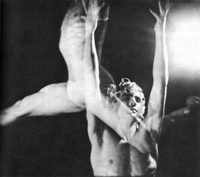Williamsburg cinema hosts Sunday program of vintage queer experimental film
The Williamsburg microcinema Ocularis illuminates a hidden corner of queer history this Sunday, January 30, with “All Words Are Flesh,” a fascinating program of vintage experimental films from the Gryphon Group, an influential, largely forgotten and remarkably queer-forward film collective.
A pioneering, mid-1950s attempt at collaborative film production and distribution, the Gryphon Group modestly described itself in one archival brochure as “an intimate association of a number of America’s leading experimental filmmakers who [believe] that film should be poetry.”
Core members included the abstract painter and filmmaker Marie Menken, her partner Willard Maas, the recently deceased avant-garde eminence Stan Brakhage and the little-known Ben Moore. Orbiting this nucleus were the gay cineastes Gregory Markopoulos, Charles Boultenhouse and Charles Henri Ford. Identifying the collective as a “proto-queer underground,” Ocularis curator Thomas Beard recovers the contributions of Markopoulos, Boultenhouse and Ford, while emphasizing the group’s shared obsession with alienated, marginal sexualities.
The outstanding attraction in Ocularis’s program is the feature-length “Narcissus” (1956), whose credits proudly proclaim: “A Gryphon Production.” Directed by Maas in “intimate association” with Moore—they also begat “The Mechanics of Love” (1955) together—“Narcissus” transports the 21st-century viewer to an impossibly remote yet unmistakable post-war New York. Lensed in tactile, contrasty black-and-white, the film renders a desolate cityscape of rubble-strewn lots and cobblestone streets traversed by a solitary youth, epitomizing the homo-coded “sad young man” of McCarthy-era popular imagination. Freckled, anorexic and draped in a grimy, torn sweatshirt, this nomadic urchin tows a makeshift wagon everywhere, which he fills with discarded mirrors, stray ostrich feathers and other necessities. The surrealist influence is subdued but pervasive—a wooden-cutout sailor points Narcissus down a darkened alley to find two men silently carrying a huge floral wreath.
On his daily scavenges, he’s caught the fancy of his mythical counterpart Echo, an insolent blonde who runs with a roughneck posse and keeps an oafish but pretty boyfriend. Echo follows Narcissus back to his clapboard shanty at river’s edge, where she interrupts his morning toilette. Terrified, the nell bolts back inside his hovel—as Echo, disgusted, hurls his slop-pail against the door—and escapes through a mirror into a dream sequence, with a beach party of maillot-clad nymphs encircling the passive, wonderstruck lad. Cloaked in fisherman’s netting and crowned with coils of kelp, he strolls into the surf amid rotted wooden pilings. Reverting to “real” time, Narcissus ventures out again, bartering a tattered bamboo parasol for a pretzel from an elderly bird-lady, one of many fanciful moments that distill the film’s innocuous charm.
A second dream sequence beams Narcissus into a joltingly lurid gay bar worthy of Otto Preminger’s “Advise and Consent.” Suddenly attired in a pristine white jersey, Narcissus is menaced by pungent close-ups of snickering bartenders, tattooed leathermen, sour transvestites, the cutout sailor come to life and even an effete black man, who marks this space as the film’s horizon of otherness. Meanwhile, the spurned, indignant Echo rallies her crew from street corner and stoop, turning into a compact mob as they chase Narcissus through a maze of alleys back to his lair. After beating him senseless while Echo looks on, gloating, the bloodied waif imagines himself wandering among marble columns topped with classical busts, an eerie mask now welded to his face.
Screened with “Narcissus” is the short Gryphon production “Dionysus” (1963) by Charles Boultenhouse, the longtime partner of renowned critic and underground bard Parker Tyler. A lot changed in the seven years separating the two films, and they are a study in contrasts. “Dionysus” revels in classical kitsch, trading the earlier film’s ashcan lyricism for brazenly contrived hijinks in a black box studio. Most incisively, the denizens of the dream bar glimpsed in “Narcissus” have moved center stage, and the closeted, angst-ridden fairy has been replaced by the nubile Greek fertility god. “Dionysus” sports a triple-layered narration in English, French and Greek, the last read by Gregory Markopoulos, whose role underscores the further contrast with his own masterwork “Twice a Man,” also from 1963, from which “Dionysus” cribs several motifs and formal devices.
With all the huzzahs over queer experimental breakthroughs in last year’s best-of surveys, it’s an opportune moment to experience firsthand the rarely revisited historical splendors of the queer cinematic avant-garde, in all its youthful innocence. Come check out this program with a sense of fun and a willingness to be surprised—the Gryphon films will reward you handsomely.
gaycitynews.com



































